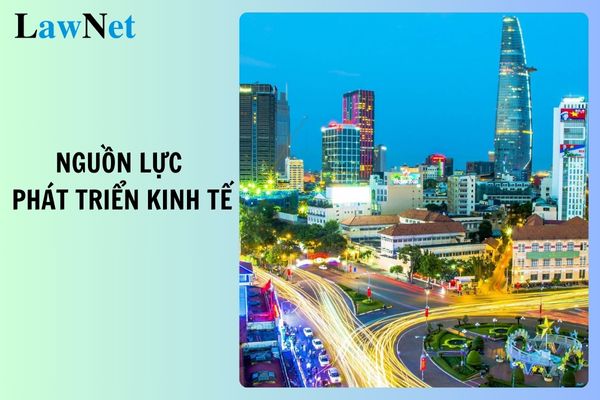Vietnam: What is the concept of sources for economic development? What are the examples of sources for economic development?
What is the concept of sources for economic development? What are the examples of sources for economic development?
Concept of sources for economic development
Sources for economic development refer to the combination of natural, socio-economic, and scientific-technological conditions that can be exploited and utilized to promote the economic growth and development of a nation, region, or locality. These sources determine the development speed, the structure of the economy, as well as the prosperity level of a nation.
Types of sources for economic development
- Natural sources: including geographical location, natural resources (land, water, minerals, forests, seas, climate).
- Socio-economic sources: including population, labor force, consumption market, infrastructure, economic policies, investment capital, trade relations.
- Scientific-technological sources: including the level of scientific and technical advancement, application of technology in production and life.
Examples of sources for economic development
- Natural sources
- Favorable geographical location: Vietnam is located in Southeast Asia, adjacent to the East Sea - a vital international maritime route, facilitating international trade and marine economic development.
- Abundant natural resources:
+ Vietnam has over 3,260 km of coastline, favorable for fishing, aquaculture, and marine tourism development (e.g., Nha Trang, Phu Quoc, Ha Long).
+ Diverse mineral resources such as oil, coal, bauxite, aiding in the development of extractive industries (e.g., oil and gas exploitation in Vung Tau, coal in Quang Ninh).
+ Fertile land, tropical monsoon climate creating favorable conditions for agriculture, particularly rice cultivation (e.g., the Mekong Delta is Vietnam's largest rice basket).
- Socio-economic sources
- Abundant human resources: With approximately 56.2% of the population aged 15 and above participating in the workforce (data from 2020), Vietnam possesses a young, hardworking, and eager-to-learn labor force.
Example: Large industrial zones such as Bac Ninh, Binh Duong, and Ho Chi Minh City attract millions of workers, boosting the manufacturing industry.
- Economic development policies: The government has open policies to attract foreign direct investment (FDI), leading to robust economic development.
Example: Major corporations like Samsung and Intel have invested in building manufacturing plants in Vietnam, creating jobs and contributing to economic growth.
- Expanding consumer market: With a population of over 100 million, Vietnam is a potential market for the development of various industries and services.
Example: The e-commerce sector is thriving with platforms like Shopee, Lazada, Tiki,...
- Scientific-technological sources
- Application of technology in production: High technology is applied in many economic sectors, enhancing productivity and product quality.
Example: In agriculture, the "smart agriculture" model uses sensors and automatic irrigation systems to increase crop yields.
- Information technology development: The software technology and artificial intelligence (AI) sectors are increasingly developing, positioning Vietnam as a major software outsourcing center in the region.
Example: FPT Corporation is thriving in the information technology sector, organizing software solutions for many domestic and international enterprises.
Note: The content is for reference only!

What is the concept of sources for economic development? What are the examples of sources for economic development? (Image from the Internet)
Is it allowed to provide internal extra classes for 10th-grade Geography in Vietnam?
Under Article 5 of Circular 29/2024/TT-BGDDT (effective from February 14, 2025) which provides regulations on internal extra classes:
Internal extra classes
1. Internal extra classes shall not charge students and are only for students registering for extra classes in specific subjects as follows:
a) Students having Unqualified academic results in a subject at the end of the immediate past semester;
b) Students selected by the school for gifted student training;
c) Voluntary final-year students registering for entrance exam preparation or graduation exam preparation according to the school's educational plan.
2. Schools shall organize for the students specified in Clause 1 of this Article to submit registration forms for extra classes in specific subjects for each grade (according to Form No. 01 in the Appendix attached to this Circular).
3. Based on the number of registered students, schools shall develop plans for organizing extra classes in specific subjects for each grade.
4. The arrangement of classes, schedules, and the organization of extra classes shall ensure the following requirements:
a) Extra classes should be organized by subject for each grade; each class shall have no more than 45 (forty-five) students;
b) Extra class schedules shall not interpose regular schedules and shall not precede the contents scheduled in the school’s educational plan;
c) Each subject is permitted a maximum of 02 (two) extra lessons per week.
5. Plans for organizing extra classes shall be publicly available on the school’s website or posted at the school.
Thus, the school is allowed to organize extra classes for 10th-grade Geography without charging fees for the following students:
- Students having Unqualified academic results in a subject at the end of the immediate past semester;
- Students selected by the school for gifted student training;
- Voluntary final-year students registering for entrance exam preparation or graduation exam preparation according to the school's educational plan.
What are the funding sources for organizing internal extra classes for 10th-grade Geography in Vietnam?
According to Article 7 of Circular 29/2024/TT-BGDDT:
Collection and management of fees for extra classes
1. The funding for organizing internal extra classes shall be covered by the state budget and other lawful sources as prescribed by law.
2. The fees for external extra classes shall follow the agreement between students' parents, students, and the extra class center.
3. The collection, management, and utilization of fees for extra classes shall comply with legal regulations on finance, state budget, assets, accounting, taxation, and other related provisions.
The funding for organizing internal extra classes for 10th-grade Geography in Vietnam shall be covered by the state budget and other lawful sources as prescribed by law.

